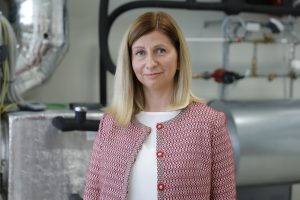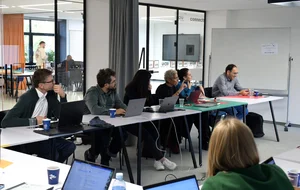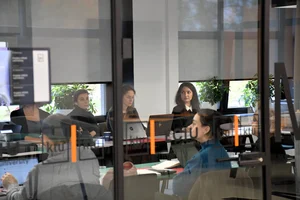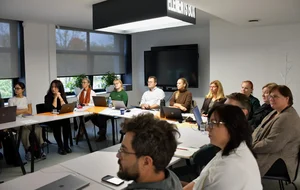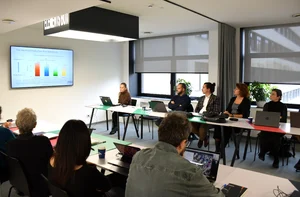“Urban change is a natural and welcome thing, but how to organise it to the satisfaction of both developers and residents is an open and unanswered question. The best way to find the answer is to share experiences with colleagues in other countries,” says Lina Šeduikytė, a researcher at KTU’s Faculty of Civil Engineering and Architecture.
Last year, Kaunas University of Technology hosted an international meeting that brought together experts from eight European countries: Germany, Greece, North Macedonia, Albania, Kosovo, Lithuania, Cyprus and Switzerland. The Erasmus+ Urban Planning for Social Resilience in Urban Neighbourhoods: Transformative Change through Civic Engagement (UPRUN) project, participants discussed urban planning and the role of civil society in building resilient urban neighbourhoods for the future.
The UPRUN Project meeting involved sharing best practices on local and international levels.
No real will to involve communities
According to Eglė Staniškienė, professor at KTU’s School of Economics and Business, in discussions about new projects a wide range of participants should be involved.
“The key to successful collaboration is early and continuous dialogue, starting from the very first stages of a project, not just when solutions are presented. It is important to allow sufficient time for in-depth discussions involving all stakeholders, including not only the local community, but also business representatives, local authority staff and academics,” said Dr Staniškienė.
While the importance of community involvement is widely recognised, the discussion highlighted several practical barriers to its effective implementation.
This lack of trust between the community and the municipality was particularly evident in the example of Šančiai district, where the development plan prepared by the community during the Genius Loci project was not approved by the Kaunas municipality.
Jurgė Vitkuvienė, a KTU’s Faculty of Civil Engineering and Architecture researcher, who participated in the Genius Loci project, added that the Šančiai project aimed to strengthen communication in the community and involve them in developing a vision for the area.
Unlike typical projects, this plan was very flexible and did not set strict boundaries but rather indicated development directions that were acceptable to the community, thus emphasising the importance of dialogue and involvement in urban planning processes.
Community education and updated regulatory framework needed
According to Dr Indrė Gražulevičiūtė-Vileniškė, this and other community projects have shown that there is a serious lack of information and knowledge about participation opportunities among residents.
“Often communities don’t trust municipalities and people feel excluded from decision-making. It is also important for municipalities not only to declare nice goals, but also to take real action, change established practices and allocate sufficient time and resources for cooperation with the community,” says Janilionytė, who works as a public engagement specialist at ID Vilnius, noting that Vilnius municipality starts implementing projects that involve community participation
According to Lina Šeduikytė, the New European Bauhaus programmes can also contribute to increasing cooperation and trust between all stakeholders.
According to KTU researchers Eglė Januškienė and Aušra Mlinkauskienė, who are also involved in UPRUN Project activities, openness, a broader approach to the problem and a willingness to cooperate are essential to change the situation.
Levels of public engagement vary between countries
Frank Othengrafen, a professor at the Technical University of Dortmund, pointed out that while Lithuania has already established special offices to promote civic engagement, the practice is not yet widespread in Germany. And his colleague Oto Potulka, a Czech currently working at the University of Basel in Switzerland, notes a lack of motivation on the part of people themselves, and a feeling of indifference towards what is being planned even if the development in question is not far away from home.
“In the Czech Republic, the main obstacle is the indifference or apathy of the population when it comes to projects that do not directly affect them. If a new development comes within a few kilometres, people are not involved. In such cases, the role of politicians and local leaders is crucial. The success of cooperation between developers and residents then depends on how these (formal and informal) leaders communicate the projects to the community,” says the researcher.
He also notes that there are examples to the contrary. For example, in Switzerland, there is already a deep tradition of participation. Here, political processes are more open to the public, making it easier for people to participate. On the other hand, debate is seen as part of a system of direct democracy. To an independent observer, these debates can seem long and interminable. But there is a reason for this: the Swiss want to make sure that everyone involved has the same understanding of the conclusions reached.


